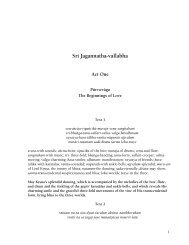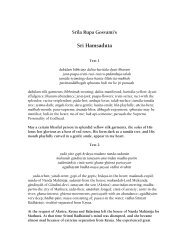Srimad Bhagavatam, Volume 3
Srimad Bhagavatam, Volume 3
Srimad Bhagavatam, Volume 3
You also want an ePaper? Increase the reach of your titles
YUMPU automatically turns print PDFs into web optimized ePapers that Google loves.
<strong>Srimad</strong> Bhagawatam, First Canto, <strong>Volume</strong> Three<br />
It is foretold herein that in the absence of monarchical regime the general<br />
mass of people will be unwanted population of the type of dogs and monkeys.<br />
As the monkeys are too much sexually inclined and the dogs are shameless in<br />
the matter of sexual intercourse, similarly the general mass of population born<br />
of illegitimate connection like the dogs and monkeys will systematically go<br />
astray from the Vedic way of good manners in the matter of qualitative<br />
engagements of the castes and orders of life<br />
The Vedic way of life is called progressive march of civilization of the<br />
Aryans. The Aryans means who are progressive in terms of Vedic civilization.<br />
The Vedic civilization aims at the destination of back to Godhead back to<br />
Home where there is no birth, no death, no oldage and no diseases. The Vedas<br />
direct every one not to remain in darkness of the material world but directs<br />
progressive march towards the light of spiritual kingdom far beyond the<br />
material sky within our vision. The qualitative caste system and the orders of<br />
life are scientifically planned by the Lord and His representatives the great<br />
Rishis; and the perfect way of mannerly life gives all sorts of instruction in the<br />
matter of both material and spiritual way of life. The Vedic way of life does<br />
not allow any man to be like monkeys and dogs for sense gratification and to<br />
fulfil the desire of mammon's philosophy one should simply devote himself in<br />
the matter of economic development. Such degarded civilization of sense<br />
gratification and economic developement is the byproducts of Godless or<br />
kingless government of the people by the people and for the people. The<br />
people in general should not therefore grudge the reaction of such<br />
maladministration by their own action.<br />
Dharmapalo narapatih satu samrat vrihat shravah<br />
Sakashat mahabhagavato rajarshir hayamedhayat<br />
Kshut trit shramayuto deeno na eva asmat sapam arhati<br />
Dharmapalo—the protecter of religiosity, Narapatih—the king, Sa—he, Tu—<br />
but, Samrat—Emperor, Vrihat—highly, Shravah—celebrated, Sakshat—<br />
directly, Mahabhagawata—the first grade devotee of the Lord, Rajarshir—<br />
saint amongst the royal orders, Hayamedhayat—great performer of Horse<br />
sacrifiices, Kshut—hunger, Trit—thirst, Shramayuta—tired and fatigued,<br />
Deeno—stricken, Na—never, Eva—thus, Asmat—by us, Sapam—curse,<br />
Arhati—deserves.<br />
The Emperor Parikshit is a pious king,he is highly celebrated, and<br />
directly the first grade devotee of the Personality of Godhead. He is a<br />
saint amongst the royal order and has performed many horse sacrifices.<br />
Such a king when he was tired and fatigued being stricken with hunger<br />
and thirst, did not at all deserved to be cursed.<br />
After explaining the general codes of royal position and asserting that the king<br />
can do no wrong and therefore he is never to be condemned, the sage Samik<br />
wanted to speak something about the Emperor Parikshit specifically. The<br />
specific qualification of Maha raj Parikshit is summarised herein that the king<br />
even calculated as a king only he was most celebrated as a ruler who<br />
administers just on the religious principles of the royal order. In the Shastras<br />
the duties of all castes and orders of the society are prescribed. All the<br />
qualities of a Kshatriya as mentioned in the Bhagwat Geeta (18.43) were<br />
present in the person of the Emperor. And besides the royal attributes he was<br />
directly a great devotee of the Lord as self realised soul. Such a king when he<br />
was tired and fatigued with hunger and thirst and personally asked for water,<br />
cursing upon him was not at all proper. The Samik Rishi thus admitted from<br />
all sides that Maharaj Parikshit was cursed by the Brahmin's son most unjustly<br />
and thus allowed the personality of Kali to enter into the established orders of<br />
the world position. Although all the Brahmins were aloof from the incidence<br />
still for the childish action of a Brahmin boy the whole atmosphere of world<br />
situation was changed and thus the Rishi Samik a Brahmin took responsibility<br />
for all deterioration of worldly good orders.<br />
Apapesu swabhrityesu valena apakka buddhina<br />
Papam kritam tadbhagawan sarvatma kshantum arhati<br />
Apapesu—unto one who is completely free from all sins, Swabhrityesu—unto<br />
one who is subordinate and deserves to be protected, Valena—by a child,<br />
Apakka—who is immature, Buddhina—by intelligence, Papam—sinful act,<br />
Kritam—has been done, Tadbhagwan—therefore the Personality of Godhead,<br />
Sarvatama—Who is all pervading, Kshantum—just to parden, Arhasi—<br />
deserve.<br />
The Rishi prayed for his son to the all pervading Personality of Godhead<br />
for pardoning his immature boy with no intelligence who commited the<br />
great sin of cursing a person who was completely free from all sins and<br />
being subordinate deserved to be protected.<br />
Every one is responsible for his own action either pious or sinful. The Rishi<br />
Samik could foresee it that his son had commited a great culpable act of sin<br />
by cursing Maharaj Parikshit who deserved to be protected by the Brahmins<br />
as he was a pious ruler as well as personally completely free from all sins on<br />
account of his becoming the first order devotee of the Lord. When offence is<br />
done unto the devotee of the Lord it is very difficult to ovcrcome from the<br />
reaction of such offensive action The Brahmins being on the head of the<br />
social orders they are meant for giving protection to the subordinates and not<br />
64<br />
to curse them. Although there are occasions when a Brahmin furiously may<br />
curse the subordinate Kshatriya or the Vaishya etc but in the case of Maharaj<br />
Parikshit there was no ground for being cursed as it is already explained. But<br />
the foolish boy had done it out of sheer vanity of being a Brahmin's son and<br />
thus he became liable to be punished by the law of God. The Lord never<br />
forgives a person who condemns His pure devotee. Therfore the foolish boy<br />
of a Brahmin had not only committed sin by cursing a King but also he had<br />
commited the greatest offence by condemning a great devotee of the Lord.<br />
Therefore the Rishi could foresee that except the Supreme Personality of<br />
Godhead no other purificatory method could save his boy from great blunder<br />
of sinful act. He therefore directly prayed for being pardoned by the Supreme<br />
Lord who can only undo a thing which is impossible to be changed. The<br />
appeal was made in the name of a foolish boy who had developed no<br />
intelligence at all.<br />
A question may be raised herein that it was the desire of the Lord that<br />
Parikshit Maharaj might be put into that awkward position so that he might be<br />
delivered from material existence then why a Brahmins son was made<br />
responsible for this offensive act. The answer is that the offensive act was<br />
made to be performed by a child only so that he could be excused very easily<br />
and thus the prayer of the father was accepted. But if the question is raised<br />
why the Brahmin community as a whole should be made responsible for<br />
allowing the Kali into the world affairs, the answer is given in the Varaha<br />
Puranam. It is said there that the demons who acted enimically with the<br />
Personality of Godhead but were not killed by the Lord were allowed to take<br />
birth in the families of the Brahmins taking advantage of the age of Kali. The<br />
all merciful Lord gave them chance to have their births in the families of the<br />
pious Brahmins so that they could further improve to get salvation but the<br />
demons instead of utilising the good opportunity misused the Brahminical<br />
culture on account of being puffed by vanity of becoming a Brahmin's son.<br />
The typical example is the son of Samik Rishi and all the foolish sons of<br />
Brahmin family are warned hereby not to become as foolish as Shringhee and<br />
be always on graud against the demoniac qualities which they had in their<br />
previous births. The foolish boy was off course excused by the Lord but for<br />
others who may not have a father like Samik Rishi will be put into great<br />
difficulty if they misuse the advantages obtained by the birth in a Brahmin<br />
family.<br />
Tiraskritah vipralabdhah saptah kshipta hata api<br />
Na asya tat pratikurvanti tad bhakta prabhavo apihi<br />
Tiraskritah—being defamed, Vipralabdhah—being cheated, Saptah—being<br />
cursed, Kshiptah—disturbed by negligence, Hata—or even being killed,<br />
Api—also, Na—never, Asya—for all these acts, Tat—them, Pratikurvanti—<br />
counter act, Tad—the Lord's, Bhakta—devotees, Prabhavo—powerful, Api—<br />
although, Hi—certainly<br />
The devotees of the Lord are so much forbearing that even they are<br />
defamed, cheated, cursed, distrubed by negligence or even they are killed<br />
they are never inclined to counter act such reverses.<br />
The Rishi Samik also knew it that the Lord does not even forgive a person<br />
who has had commited offence at the feet of a devotee. The Lord can only<br />
give direction to take shelter of the devotee only. He thought within himself<br />
that if Maharaj Parikshit would counter curse the boy he might besaved. But<br />
he knew it also that a pure devotee is callous about worldly advantages or<br />
reverses. As such the devotees are never inclined to counter act any action on<br />
them by personal defamation, curse negligence etc. So far such things are<br />
concerned in personal affairs the devotees do not care for them. But in case of<br />
their being performed on the Lord and his devotees then the devotee takes<br />
very strong action. It was a case of personal affair and therefore Samik Rishi<br />
knew it that the king would not take any counter action. Thus there was no<br />
alternative than to place appeal to the Lord for consideration of the immature<br />
childish boy.<br />
It is not that only the Brahmins are powerful to award curse or blessings<br />
upon the subordinates but the devotee of the Lord even though he may not be<br />
a Brahmin is more powerful than a Brahmin. But such powerful devotee never<br />
misuses the power for personal benefit. Whatever power the devotee may<br />
have it is always utilised in the matter of service towards the Lord and His<br />
devotees only.<br />
Iti Putra krita aghena sa anutapta munih<br />
Swayau viprakrto rajna na eva agham tad achintayat.<br />
Iti—thus, Putra—son, Krita—done by, Aghena—by the sin, Sa—he the Muni,<br />
Anatapta—regretting, Munih—the sage, Swayam—personally, Viprakrita—<br />
being so insulted, Na—not, Eva—certainly, Tad—that, Achintayat—thought<br />
of it.<br />
The sage thus regretted the sin commited by his own son and the insult<br />
which was done to him by the king was not very seriously taken by him.<br />
The actual position of the whole incidence is now cleared up. Maharaj<br />
Parikshit's garlanding ths sage with a dead snake was not at all very serious<br />
offence but Sringhee's cursing upon the king was a serious offence. The<br />
serious offence was done by a foolish child only therefore he deserved to be












